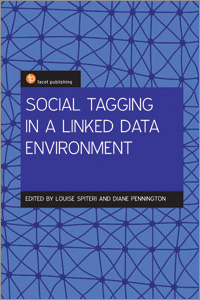
Primary tabs
You don't need to be an ALA Member to purchase from the ALA Store, but you'll be asked to create an online account/profile during checkout to proceed. This Web Account is for both Members and non-Members. Note that your ALA Member discount will be applied at the final step of the checkout process.
If you are Tax-Exempt, please verify that your account is currently set up as exempt before placing your order, as our new fulfillment center will need current documentation. Learn how to verify here.
- Description
- Table of Contents
- About the authors
- Reviews
Social tagging, hashtags, and geotags are used across a variety of platforms (Twitter, Facebook, Tumblr, WordPress, Instagram) in different countries and cultures. This book, representing researchers and practitioners across different information professions, explores how social tags can link content across a variety of environments.
Most studies of social tagging have tended to focus on applications like library catalogs, blogs, and social bookmarking sites. This book, in setting out a theoretical background and the use of a series of case studies, explores the role of hashtags as a form of linked data—without the complex implementation of RDF and other Semantic Web technologies.
Contents
List of figures and tables
Contributors
1 Introduction: the continuing evolution of social tagging
Diane Rasmussen Pennington and Louise F. Spiteri
2 Tagging the semantic web: combining Web 2.0
and Web 3.0
Laura Cagnazzo
3 Social tags for linked data with Resource Description
Framework (RDF)
Sue Yeon Syn
4 Social tagging and public policy
Ryan Deschamps
5 Hashtags and library discovery systems
Louise F. Spiteri
6 Social information discoverability in Facebook groups:
the need for linked data strategies
Laurie Bonnici and Jinxuan Ma
7 #FandomCommunication: how online fandom
utilises tagging and folksonomy
Max Dobson
8 Keys to their own voices: social tags for a dementia
ontology as a human right
Diane Rasmussen Pennington
9 Social tagging and the enterprise: an analysis of
social tagging in the workplace
Sanjay Khanna
10 Use and effectiveness of social tagging recommender
systems
Kishor John
Index
Louise F. Spiteri
Dr. Louise F. Spiteri is Director of the School of Information Management, Dalhousie University, Halifax, Nova Scotia, Canada. She has published extensively in the areas of social tagging, folksonomies, social discovery systems, and library cataloguing. She teaches in the areas of information management, metadata, records management, cataloging, classification, and taxonomies.
Diane Pennington
Diane Rasmussen Pennington is a Lecturer in Information Science at the University of Strathclyde, UK. Diane worked as a corporate IT professional and then a systems librarian before becoming a full-time academic in 2005. Diane’s PhD dissertation focused on social tagging practices of photojournalism professionals, and tagging has remained as a central focus of her research. Diane served as the Association for Information Science & Technology’s Social Media Manager from 2014-2016.
"Pennington and Spiteri have pulled together a kaleidoscope of scenarios that explore the role and evolution of social tagging. From traditional library discovery systems and recommender systems to ontologies for dementia, effects on public policy to cognitive authority in Facebook communities, to Web 2.0, Web 3.0, and beyond. Tagging and linking—two words that imply so much more than what they say—provide the core for this work. A valuable collection for anyone wanting to explore the possibilities of letting people have their say through the simple act of contributing their own words…#goodread #liked"
— Shawne D. Miksa, Associate Professor, University of North Texas
"Pennington, Spiteri, and their thoughtful contributing authors give us a thesaurus, a treasure chest of concepts, constructs, and tools for building new means of navigating constellations of people authoring, publishing, and looking for information. How do we find useful information? How do we bring information to the point of use? How do we determine veracity and cognitive authority of information? Who is now to link what with whom? Here the reader will find much to use and much to ponder."
— Brian O’Connor, Professor, University of North Texas


